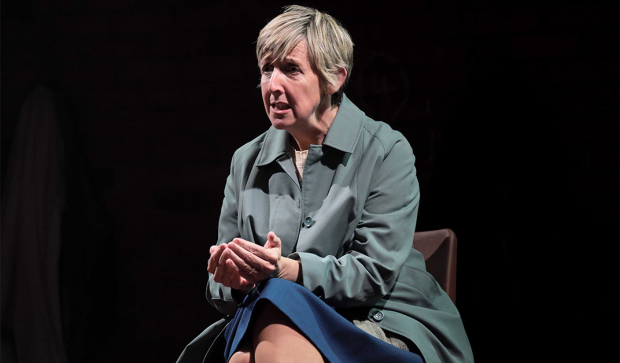Review: There Are No Beginnings (Leeds Playhouse)
Charley Miles’ show plays in the theatre’s new space until 2 November

© Zoe Martin
The long closure of Leeds Playhouse has produced a transformation rather than a mere refurbishment. Apart from opening up the public areas, a third designated theatre space has been added to the existing Quarry and Courtyard.
The Bramall Rock Void has been dug out in the depths of the building to provide a versatile black box capable of seating about 120 audience members, depending on the configuration. The opening play, Charley Miles' There Are No Beginnings, is presented on a traverse stage, with six perfectly suited rows of steeply raked seats on each side.
One suspects that simplicity and flexibility are going to be the hallmarks of the Bramall – and Amy Leach's production delivers on both counts. Essentially there is a raised block covering most of the acting area, with very little on it – sometimes nothing, now and again a television, a record-player, a pile of clothes. The actors are presented as actors, each with a drawer and a hanger or two on the bare walls where they find props and clothes for audience-visible changes. Nearly all the action takes place on the block, but the other actors are there in the corners of the acting area, chipping in with comments or effecting a neat change of situation.
Much of the publicity emphasises that this is not a play about the Yorkshire Ripper. Well, yes, up to a point. The play is about four women or girls in Leeds between 1975 and 1980 and the menace of the Ripper looms large, especially in the first half. Recordings of news items and interviews, chopped and sometimes distorted, punctuate the action and at the end there is a sort of double climax to the play: to reveal one would be a mean bit of plot spoiling, but the other is the arrest of the Ripper himself.
The play begins with a difference of opinion between June, a social worker running a unit for vulnerable young women, and ambitious police constable Fiona. What should they do with Helen, a teenage sex worker thrown out of her aunt and uncle's house? June decides to take her in for the night herself which means having Helen share a room with her 15 year-old daughter, Sharon.
The obvious connections are between the two pairs June and Fiona – compatible personally, but with different social philosophies – and Helen and Sharon, their friendship growing despite the difference in backgrounds and social expectations. The funniest scene in a not generally funny play is the acutely observed first meeting of the two girls, Sharon snobbish almost against her will, Helen wary of offers of friendship when they eventually come. Relationships begin to overlap – questions are raised as to whether or not June is more motherly to the victims of society than to her own daughter – all of which is coloured by the fear of the Ripper.
In the second half, the direct Ripper connection recedes to some extent, as Sharon's achievements and predicaments take centre stage together with the fraught question of how far these respectable characters really treat Helen as an equal.
The overall effect is less dynamic than the subject matter and production style might suggest. Rather a lot of stage time consists of two characters standing opposite each other, arguing different and sometimes predictable viewpoints. That it still engrosses is due to the four actors delivering committed and credible performances. As Sharon, Tessa Parr's transformation into an argumentative and selfish 15 year-old is beautifully done and Julie Hesmondhalgh (June) carries conviction in every phrase, gesture and half-laugh. Natalie Gavin finds the sensitivity and vulnerability behind Helen's "bad girl" exterior and Jesse Jones, with the least developed character in Fiona, teeters skilfully on the brink of being sympathetic.




















